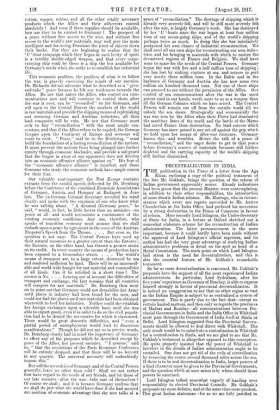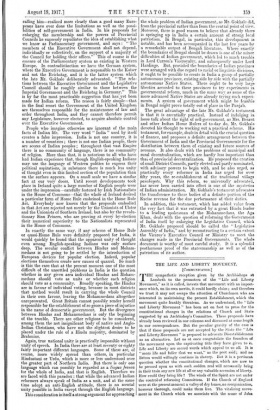DECENTRALIZATION IN INDIA.
THEpublication in the Tames of a letter from the Aga Khan, enclosing a copy of the political testament of the late Mr. Gokhale, brings the question of the reform of Indian government appreciably nearer. Already indications had been given that the present Ministry were contemplating, in addition to their other responsibilities, the introduction of some drastic Indian reforms. Mr. Montagu, who in circum- stances which every one regrets succeeded to Mr. Austen Chamberlain at the India Office, had prefaced his succession by a strong declaration in the House of Commons in favour of reform. More recently Lord Islington, the Under-Secretary of State for India, in a lecture at Oxford sketched out a somewhat elaborate scheme for the reconstruction of Indian administration. The latter pronouncement is the more important, because it could hardly have been made without the approval of Lord Islington's official superiors, and its author has had the very great advantage of studying Indian administrative problems in detail on the spot as head of a Royal Commission. The main point on which Lord Islington laid stress is the need for decentralization, and this is also the essential feature of Mr. Gokhale's remarkable testament.
So far as mere decentralization is concerned, Mr. Gokhale's proposals have the support of all the most experienced Indian administrators. In particular, Lord Sydenham, after his five years' experience as Governor of Bombay, is able to express himself strongly in favour of provincial decentralization. It is indeed no exaggeration to say that no other region so vast as the Indian Empire is subject to so centralized a system of government. This is partly due to the fact that—except on certain limited matters, and then only as regards the provinces of Madras and Bombay—all communications between Pro- vincial Governments in India and the India Office in Whitehall must pass through the Government of India itself at Simla or Delhi. Lord Islington suggested that the Provincial Govern- ments should be allowed to deal direct with Whitehall. The only result would be to substitute a centralization in Whitehall for a centralization in Simla, and we are glad to see that Mr. Gokhale's testament is altogether opposed to this conception. He quite properly insisted that the power of Whitehall to interfere in the details of Indian administration ought to be curtailed. One does not get rid of the evils of centralization by removing the centre several thousand miles across the sea. If there is to be real decentralization in India, larger powers of a final character must be given to the Provincial Governments, and the question which at once arises isby whom should those powers be exercised.
Lord Islington talked somewhat vaguely of handing over responsibility to elected Provincial Councils. Mr. Gokhale's proposals are more definite, and at the same time more prudent. This great Indian statesman—for so we are fully justified in calling him—realized more clearly than a good many Euro- peans have ever done the limitations as well as the possi- bilities of self-government in India. In his proposals for enlarging the membership and the powers of Provincial Councils he expressly repudiates the idea of establishing what we know as Parliamentary government, and says " The members of the Executive Government shall not depend, individually or collectively, on the support of a majority of the Council for holding their offices." This of course is the essence of the Parliamentary system as existing in Western Europe. In contradistinction we have the German system, where the Executive Government is responsible to the Kaiser and not the Reichstag, and it is the latter system which the late Mr. Gokhale deliberately advocated. " The rela- tions between the Executive Government and the Legislative Council should be roughly similar to those between the Imperial Government and the Reichstag in Germany." This is by far the most practicable suggestion that has yet been made for Indian reform. The reason is fairly simple—that in the final resort the Government of the United Kingdom are themselves responsible for the maintenance of law and order throughout India, and they cannot therefore permit any Legislature, however elected, to acquire absolute control over the Executive Government.
People who imagine otherwise are ignorant of the main facts of Indian life. The very word " India " used by itself creates a false impression. India is not one country, it is a number of countries ; there is not one Indian people, there are scores of Indian peoples ; throughout that vast Empire there is no community of language, there is no community of religion. More than that, it is notorious to all who have had Indian experience that, though English-speaking Indians may use the language of Western politics to express their political aspirations, in substance there is much less unity of thought even in this limited section of the population than on the surface appears. On a small scale we have a similar fact at our very doors. Until recent developments took place in Ireland quite a large number of English people were under the impression—carefully fostered by Irish Nationalists in the House of Commons—that the whole of Ireland desired a particular form of Home Rule enshrined in the Home Rule Act. Everybody now knows that the proposals embodied in that Act are rejected not merely by the Unionists of Ulster and the Unionists of Southern Ireland, but also by the revolu- tionary Sinn Peiners, who are proving at every by-election their numerical superiority to the Nationalists represented in the House of Commons.
In exactly the same way, if any scheme of Home Rule or quasi-Homo Rule were definitely proposed for India, it would quickly be found that the apparent unity of thought even among English-speaking Indians was only surface deep. The secular conflict between Hindus and Moham- medans is not going to be settled by the introduction of European devices for popular election. Indeed, popular elections themselves create new causes of quarrel. So much is this the case that at the present moment one of the most difficult of the unsettled problems in India is the question whether in any given area individual Hindus and Moham- medans should vote as units or whether each religion should vote as a community. Broadly speaking, the Hindus are in favour of individual voting, because in most districts that method would result in carrying the whole Council in their own favour, leaving the Mohammedans altogether unrepresented. Great Britain cannot possibly render herself responsible for the establishment of so gross a piece of injustice in the name of democratic government. But the divergence between Hindus and Mohammedans is only the beginning of the trouble. There are other religions to be considered, among them the not insignificant body of native and Anglo- Indian Christians, who have not the slightest desire to be placed under the rule of a Hindu majority, dominated by Brahmins.
Again, true national unity is practically impossible without unity of speech. In India there are at least seventy or eighty fairly important different languages. Some of these are, of course, more widely spread than others, in particular Hindustani or Urdu, which is more or less understood over the greater part of Northern India. But there is only one language which can possibly be regarded as a lingua franca for the whole of India, and that is English. Therefore we are faced with this paradox : that while the advanced Indian reformers always speak of India as a unit, and at the same time adopt an anti-English attitude, there is no mental unity possible in India except through the English language.
This consideration is itself a strong argument for approaching the whole problem of Indian government, as Mr. Gokhale from the provincial rather than from the central point of view. Moreover, there is good reason to believe that already there is springing up in India a certain amount of strong local patriotism. In Bengal, in particular, this development is notable, and has been accompanied in the last few years by a remarkable output of Bengali literature. Where exactly the boundaries of Bengal should be drawn is one of the minor difficulties of Indian government, which led to much trouble in Lord Curzon's Viceroyalty, and subsequently under Lord Hardinge. But, provided the boundaries of Indian provinces were arranged with due regard to racial or linguistic divisions, it ought to be possible to create in India a group of partially autonomous provinces, existing side by side with the partially autonomous Native States. There ought to be very large liberties accorded to these provinces to try experiments in governmental reform, much in the same way as some of the more advanced Native States are already trying such experi- ments. A system of government which might be feasible in Bengal might prove totally out of place in the Punjab.
The great advantage of the late Mr. Gokhale's testament is that it is essentially practical. Instead of indulging in loose talk about the right of self-government, as Mrs. Besant and other Indian Home Rulers of to-day do, Mr. Gokhale devoted his thought to working out a practical scheme. His testament, for example, deals in detail with the crucial question of finance, and proposes a definite arrangement between the Government of India and the Provincial Governments for the distribution between them of existing and future sources of revenue. It also deals with the problems of municipal and rural decentralization, which are hardly less important than that of provincial decentralization. He proposed the creation of small District Councils, partly elected and partly nominated, with advisory powers to begin with, and he also urged, as practically every reformer in India has urged for over fifty years, the re-establishment of the traditional village panchayets. Why this reform, so universally advocated, has never been carried into effect is one of the mysteries of Indian administration. Mr. Gokhale's testament advocates the transference to these bodies of a definite portion of the Excise revenue for the due performance of their duties.
In addition, this testament, which has added value from the very fact that it was entrusted by a great Hindu leader to a leading spokesman of the Mohammedans, the Aga Khan, deals with the question of reforming the Government of India itself by enlarging the Legislative Council, which Mr. Gokhale proposed should be called the " Legislative Assembly of India," and by reconstructing to a certain extent the Viceroy's Executive Council or Ministry to meet the changes made in the Provincial Governments. The whole document is worthy of most careful study. It is a splendid posthumous proof of the statesmanship as well as of the patriotism of its author.



























 Previous page
Previous page